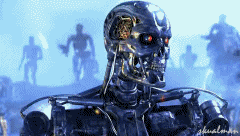Human Life Soon Worth $0
The distrust, wealth inequality and chaos created by the rise of AI compounds the current poly-crisis, hastening the march to fascism, war and civilizational collapse.

“AI will probably most likely lead to the end of the world, but in the meantime, there’ll be great companies.”
- OpenAI CEO Sam Altman
The AI hype may have gone quiet, but don't let that fool you. Something big is coming and the threat is growing.
But not in the way you may think.
Despite my pen name, I don't envision robots will soon become sentient and destroy humanity. AI will threaten our survival long before something like that is even possible.

It's not sentient robots we need to worry about for the moment. Rather, it's other humans pushing the value of life to nothing.
While the techno-optimists consider the rise of AI as a new era of abundance, I believe AI's destructive power is appearing at the worst possible time for most of humanity.
The distrust, wealth inequality and chaos created by the rise of AI compounds the current poly-crisis, hastening the march to fascism, war and civilizational collapse.
"This is not a drill"
We are fast approaching a moment in our history where no electronic communications can be trusted to be authentic. Not a face-time call from your spouse, a message from your daughter or a text from your boss.
It is becoming exponentially easier to capture the audial and visual essence of a person simply using a few existing images and seconds of sound. It's identity theft to the extreme.
There have already been numerous reports of people receiving a desperate call from a 'family member' in distress pleading for money, only to get scammed.
It's only a matter of time until an AI version of Putin declares war with America or a replicant Kim Jong Un announces he's launching nuclear missiles at Seoul. Think of the damage that could be done by a lone wolf with the basic skills to use these AI tools.
Remember the mass panic in Hawaii when an accidental text was sent to residents saying a nuke was on its way? "This is not a drill", read the message.

That panic can be amplified by an AI-powered realistic televised threat by a world leader.
If the announcement appears credible and can be corroborated in some way - perhaps by manufactured evidence created in tandem with the phony declaration - it's possible that militaries will immediately retaliate. The world remains on a 15-minute hair-trigger to nuclear Armageddon.
This is not far fetched. The world has come close to nuclear annihilation several times because of misperceived threats. In those situations there was always room to give the benefit of the doubt. The margin for error shrinks when a fake but convincing Kim Jong Un - backed up by falsified satellite imagery - is broadcast across worldwide TV networks threatening to obliterate South Korea.
We will soon live in a world where fact cannot be discerned from fiction. Today, pros might spot the fake, and the general public will become completely dependent on authorities to tell us what's real and what's not. A frightening paradigm. But eventually even defense experts will be fooled. This would mark a dramatic turn in nuclear strategic calculus.
Stealing your soul
While voice and video emulation can be used for nefarious purposes, it is also becoming a way to immortalize the dead. Recently, an AI-version of long-deceased comic George Carlin released a new standup special. While not perfect, it is close enough for the non-discerning listener. Give it a year and the technology will be greatly improved.
This type of imitation has powerful implications. This is exactly what Hollywood was striking against.
Who cares about Hollywood celebrities, right? Well, this is all fun and games until it happens to you or someone you love.
Here's George Carlin's daughter's - Kelly Carlin - reaction:
“My dad spent a lifetime perfecting his craft from his very human life, brain and imagination,” she wrote. “No machine will ever replace his genius. These AI generated products are clever attempts at trying to recreate a mind that will never exist again.”
"I’m worried about his legacy. His reputation. His art. I’m allowed to do that as his daughter and while I’m alive," Kelly Carlin said in an additional post. "It’s important that these corporations don’t rape & pillage art."
“Here’s an idea, how about we give some actual living human comedians a listen to?” Carlin continued. “But if you want to listen to the genuine George Carlin, he has 14 specials that you can find anywhere.”
"They are coming for you next."
Humans weaponizing AI can steal your security, your money, your identity and your career. They can impersonate others. But can they steal your thoughts and personality?
The answer is "yes".
Immortality
For those who don't know Charlie Munger, he was the long-time partner of Warren Buffett. Munger was a sharp man with an admirable, but often abrasive, wit and wisdom. Popular with the investing crowd, Munger was widely read and quoted.
Upon Munger's death in 2023, someone built a virtual 'brain' using his books and speech transcripts as inputs. Interfacing with that brain is a simple, yet ingenious, Charlie Munger chatbot.
Anyone can now have a text-based conversation with the investing legend. The chatbot answers in the style and context one might expect from Charlie Munger. Munger's thoughts and personality have effectively been immortalized.
It's only a matter of time until someone combines this idea with video and audio to fully replicate a Face-time conversation with any deceased person.
So not only can they steal your security, money, identity and career. Humans can use AI to steal your soul.
The Charlie Munger chatbot is rudimentary, but like all AI tech the improvements are happening on an exponential timeline. This technology will quickly improve and soon converge to become so powerful, so user friendly, so convincing that human perception will go haywire.

Stealing your heart
It doesn't stop there. AI chatbots have been created to steal your heart too. Already, you can sign up for the 'perfect' digital girlfriend or boyfriend.
As AI technologies converge, a thinking, 'feeling' brain manifested audially and visually will be as real as most other relationships you have in a virtual world. She'll chat with you, send you texts, email you, Face-time you, send you videos. It'll only get more realistic with time.
Traditionalists would argue there's no substitute for the real thing. True, but many aren't getting the real thing. And for others, the real thing is an utter disappointment.
The virtual 'friend' is the antidote to a loneliness epidemic sweeping the world. Forever in the honeymoon stage of the relationship she won't complain about your cleanliness and he won't moan about your friends. He's always happy to see you and interested in how your co-worker annoyed you for the 97th time. No baggage, no hang-ups...but plenty of neurochemical triggers to keep you hooked.
Considering how many socialize exclusively online, it's not a stretch to imagine people forming deep, emotional, long-term bonds with a virtual friend.
Some joke that this appeals to the fringes of society, but so did online dating at first. As the technology matures, many will be enticed to try it out for fun. But the trap is set. Behavioral manipulation built into the software will have them coming back for more. Just like Plenty of Fish and Tinder, a virtual 'friend' will become normalized.
Two years ago could anyone imagine they'd be glued to their phones every night doomscrolling through Instagram reels? Many of our daily technological habits and dependencies weren't thinkable a few years ago. Yet, they've become widespread.
I think we're only a few years from re-examining how we define relationships. Many will happily stick to their virtual significant other. Those who still seek carbon-based flesh will forge a new path to polyamory, as normalized digital relationships complement reality.
I also think we're only a few years from headlines about population collapse, as a significant portion of Gen Z abandons human-to-human relations altogether.

Just add arms and legs
The soul, the mind, the heart...now AI just needs a body.
Tesla and Boston Dynamics have spent years perfecting multi-modal robot capabilities. While these robots are currently 'dumb', their physical capabilities are impressive.
Soon, AI will merge with robotics. Initially, these two capabilities will combine to perform highly specialized tasks humans don't want to do, such as fighting forest fires. Sort of like a glorified Roomba vacuum.
However, eventually these robots will have multi-dimensional capabilities and serve more general purposes. To Tesla's advantage, they have massive quantities of geospatial data and navigation capabilities generated by their automobiles. Combined with generative AI and comprehensive physical abilities, Tesla's robots could eventually replicate most human activity.
Here's what a day might look like if I had one of these robots - let's call him Henry: I wake up and Henry has already exercised the dog and made coffee. He briefs me on my important tasks for the day and suggests activities he could help with. I sit down at my desk to work while the Henry cleans the toilet, picks up the dry-cleaning, buys bread and trims the hedges. The drycleaner and grocer are also run by similar robots. In fact, many of Henry's public encounters are with fellow robots.
If manufactured at scale, the price of these robots could be easily accessible. With enough time, these robots would permeate every corner of civilization. If skinning technology advances as fast as audio emulation, who knows how these things will be used in the future.
What is the price of a human life?
I don't have a maid, but if the choice came down to hiring one for $2500 per year or buying a Henry for $30,000 that lasts indefinitely with the right maintenance, the rational choice is to buy the robot. The decision is justified even further if that robot can multitask.
Replicate that evaluation across many tasks and jobs, and robots could become as ubiquitous as automobiles.
Along the way, someone is going to make a lot of money while humans become the walking dead among a sea of immortals.
The utopian case for AI is a productivity renaissance for humanity, freeing up time to pursue leisurely activities. They said the same thing about the personal computer and email communications, yet we're worked to the bone and drowning in messages.
The depressing reality: AI will be used by owners of capital to make more money - either by further exploiting labor or making it redundant. The era of abundance techno-optimists speak of doesn't just refer to the supply of goods. It refers to an abundance of labor. Greater supply pushes the value of human labor towards zero.
People like Sam Altman - CEO of OpenAI - may have started with humanistic goals, but billions of dollars plus the involvement of profit-seeking players (Microsoft), power-hungry state actors and nefarious deviants have a way of changing motivations.
When 50, 60, 70% of human labor becomes obsolete and is replaced by more cost effective AI, many propose some form of universal basic income must be created. Otherwise, there'd be rioting in the streets as people lose their homes and can't pay for food.
However, when it comes time to cough up the money a diabolical billionaire genius will have another idea: "What if instead of UBI, we built a protective ring around us (a $100 million bunker in Hawaii, perhaps?) and let half the population starve? They have zero value to us and within a few weeks they'll be dead, all resource issues are solved and the planet can begin to heal."
Whether this conspiratorial scenario is already part of the plan is irrelevant.
When it comes time to make a decision, abandoning the bulk of humanity becomes a cost-effective option. If human value can easily be replicated, we simply become numbers on a spreadsheet. And that number could soon be zero.



